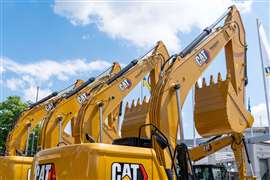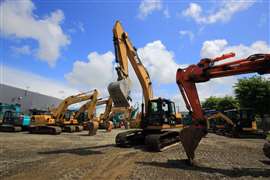Brexit warnings for UK
05 December 2017

The UK government has been issued a warning by the construction sector about the dangers of the industry facing a cliff edge regarding access to EU workers after Brexit (the UK’s decision to leave the European Union).
Seven of the UK’s major trade bodies have come together to produce the Construction Industry Brexit Manifesto, which it said was an unprecedented show of unity.
The trade bodies have set out what they believe to be the sector’s responsibilities and requirements in a post-Brexit labour market.
Also, at a second Brexit Briefing organised by the UK’s Construction Equipment Association (CEA), former MEP Malcolm Harbour described the EU as the most advanced market in the world, adding, “We should not give that away.”
The Construction Industry Brexit Manifesto commits the sector to doing much more to recruit and train additional UK workers to reduce its future reliance on migrant labour. However, it makes clear that this would not be able to happen overnight and that, for some time, it is likely that an ongoing need for significant levels of skilled EU workers would remain.
The seven UK construction trade bodies are the Federation of Master Builders, Association for Consultancy & Engineering, Build UK, Civil Engineering Contractors Association, Construction Products Association, Home Builders Federation, and National Federation of Builders.
The document sets down the industry’s key messages to the government on what it will need from a post-Brexit immigration system in order to be able to deliver the government’s strategic objectives for new housing and infrastructure.
Budget
In its latest Budget, the UK government set out a new package of financial support for housing worth £15.3 billion (€17.18 billion) over the next five years, which it said brought total support for housing to at least £44 billion (€49.41 billion) for this period.
According to the manifesto, the government should agree a transition period of at least two years as soon as possible, during which time EU workers arriving in the UK should continue to have a path to settled status.
Then, the post-transitional migration system should be based on key occupations that are in short supply, rather than on “arbitrary thresholds” based on skill levels or income.

Brian Berry, chief executive of the Federation of Master Builders, said, “The construction industry has been criticised in the past for being too disparate, but it has come together here with one voice and set of clear messages.
“We know we need to step up as an industry and train more home-grown talent, but we also have to be realistic about the future. There will continue to be some ongoing need for migrant workers and our post-Brexit migration rules will need to be fit for purpose.”
Dr Nelson Ogunshakin, CEO of the Association for Consultancy & Engineering (ACE), said, “Without the skills that many EU nationals bring to the industry, we could be facing severe setbacks to the UK’s national infrastructure pipeline.
“ACE’s own surveys show that there is an increase in the number EU staff leaving the UK for jobs on the continent, and this will only get worse if we do not bring certainty to EU workers’ residency rights.”
He said the manifesto provided a road map for both the government and industry to ensure that the UK could continue to access world-class talent to deliver world-class construction.
Suzannah Nichol, chief executive of Build UK, said, “Construction, like other major industry sectors, has substantial concerns over the impact of Brexit on its ability to recruit, train and retain talent. It is essential that industry works together to present the need for an effective partnership between government and industry, enabling us to deliver the UK’s infrastructure, homes and communities.”
Marie-Claude Hemming, director of external affairs at the Civil Engineering Contractors Association, said, “The UK’s decision to leave the EU will have a notable impact upon the ability of the infrastructure sector to source the skills needed for current and future projects. But if we are to ensure that the UK remains an attractive place to live and work in a post Brexit world, government must maintain its focus on construction and infrastructure.
“It is vital that industry and government work together to ensure the UK’s global competitiveness is not impacted upon by delay in the delivery of world-class construction projects.”
Prof Noble Francis, economics director at the Construction Products Association, said, “Access to the right skills will be absolutely critical for the whole construction supply chain in the next few years if it is to help government achieve its aims of building more affordable housing and improving the UK’s infrastructure, which will be vital for boosting UK productivity.”
John Slaughter, director of external affairs at the Home Builders Federation, said, “With the Budget having confirmed a target to deliver 300,000 homes a year by the mid-2020s, home builders will need to continue to bring more skilled people into the industry.
“Companies are building on their existing investment through the successful work of the CITB (Construction Industry Training Board)-supported Home Building Skills Partnership and are committed to doing even more, but to deliver the national social and economic necessity of an improved housing supply we will also continue to need access to foreign workers under a manageable migration system.”
Richard Beresford, chief executive of the National Federation of Builders, said, “With the country facing a shortage of skilled workers and the most acute housing crisis in living memory, the government needs to provide certainty to existing EU workers in the UK and enable construction SMEs to attract more home-grown talent into the industry.”
Optimum result
The CEA Brexit Briefing II was held in Manchester, UK. Malcolm Harbour, who is a patron of the CEA as well as a former MEP, said he thought a “Norway-style” deal would be the optimum result of Brexit talks.
Although not an EU Member State, Norway has full access to the single market. To enable this, it pays a contribution to the EU Budget, and signs up to its rules, including its common regulations and standards.
EU residents are free to live and work in Norway, but the country is exempt from EU rules on agriculture, fisheries, justice and home affairs. On the other hand, Norway does not have a say in the setting of the Single Market rules.

Harbour said he was passionate about the Single Market. “It’s a great achievement,” he said. Addressing the question of free trade after leaving the EU, he said it would be nothing like what was available via the Single Market.
He pointed to the case of Turkey, which is in the Customs Union but not the Single Market. “The crucial thing is being in the Single Market,” said Harbour.
He told delegates at the conference, “Manufacturers can be backward about coming forward. Don’t underestimate the power you have over events.”
Malcolm Kent, CEA senior technical consultant, spoke to the Brexit Briefing about the possible effects on regulations and directives in the UK after its split from the EU.
He said that as far as legislation was concerned, all directives, regulations and ECJ (European Court of Justice) judgements would continue to apply in the UK. These would include the Machinery Directive, Noise Directive, engine emissions regulations and others.
Kent said that manufacturers who carry out self-assessment could continue. If a third party assessment was relied on, then it could be different post Brexit when new assessments would need to be by a body notified by an EU member state.






